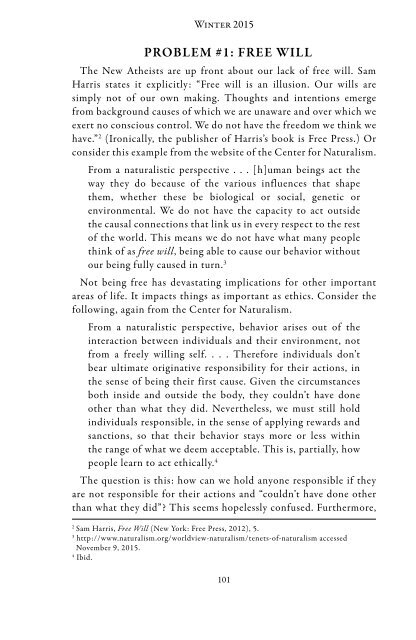THE CITY
h6c7p5d
h6c7p5d
Create successful ePaper yourself
Turn your PDF publications into a flip-book with our unique Google optimized e-Paper software.
Winter 2015<br />
PROBLEM #1: FREE WILL<br />
The New Atheists are up front about our lack of free will. Sam<br />
Harris states it explicitly: “Free will is an illusion. Our wills are<br />
simply not of our own making. Thoughts and intentions emerge<br />
from background causes of which we are unaware and over which we<br />
exert no conscious control. We do not have the freedom we think we<br />
have.” 2 (Ironically, the publisher of Harris’s book is Free Press.) Or<br />
consider this example from the website of the Center for Naturalism.<br />
From a naturalistic perspective . . . [h]uman beings act the<br />
way they do because of the various influences that shape<br />
them, whether these be biological or social, genetic or<br />
environmental. We do not have the capacity to act outside<br />
the causal connections that link us in every respect to the rest<br />
of the world. This means we do not have what many people<br />
think of as free will, being able to cause our behavior without<br />
our being fully caused in turn. 3<br />
Not being free has devastating implications for other important<br />
areas of life. It impacts things as important as ethics. Consider the<br />
following, again from the Center for Naturalism.<br />
From a naturalistic perspective, behavior arises out of the<br />
interaction between individuals and their environment, not<br />
from a freely willing self. . . . Therefore individuals don’t<br />
bear ultimate originative responsibility for their actions, in<br />
the sense of being their first cause. Given the circumstances<br />
both inside and outside the body, they couldn’t have done<br />
other than what they did. Nevertheless, we must still hold<br />
individuals responsible, in the sense of applying rewards and<br />
sanctions, so that their behavior stays more or less within<br />
the range of what we deem acceptable. This is, partially, how<br />
people learn to act ethically. 4<br />
The question is this: how can we hold anyone responsible if they<br />
are not responsible for their actions and “couldn’t have done other<br />
than what they did”? This seems hopelessly confused. Furthermore,<br />
2<br />
Sam Harris, Free Will (New York: Free Press, 2012), 5.<br />
3<br />
http://www.naturalism.org/worldview-naturalism/tenets-of-naturalism accessed<br />
November 9, 2015.<br />
4<br />
Ibid.<br />
101


